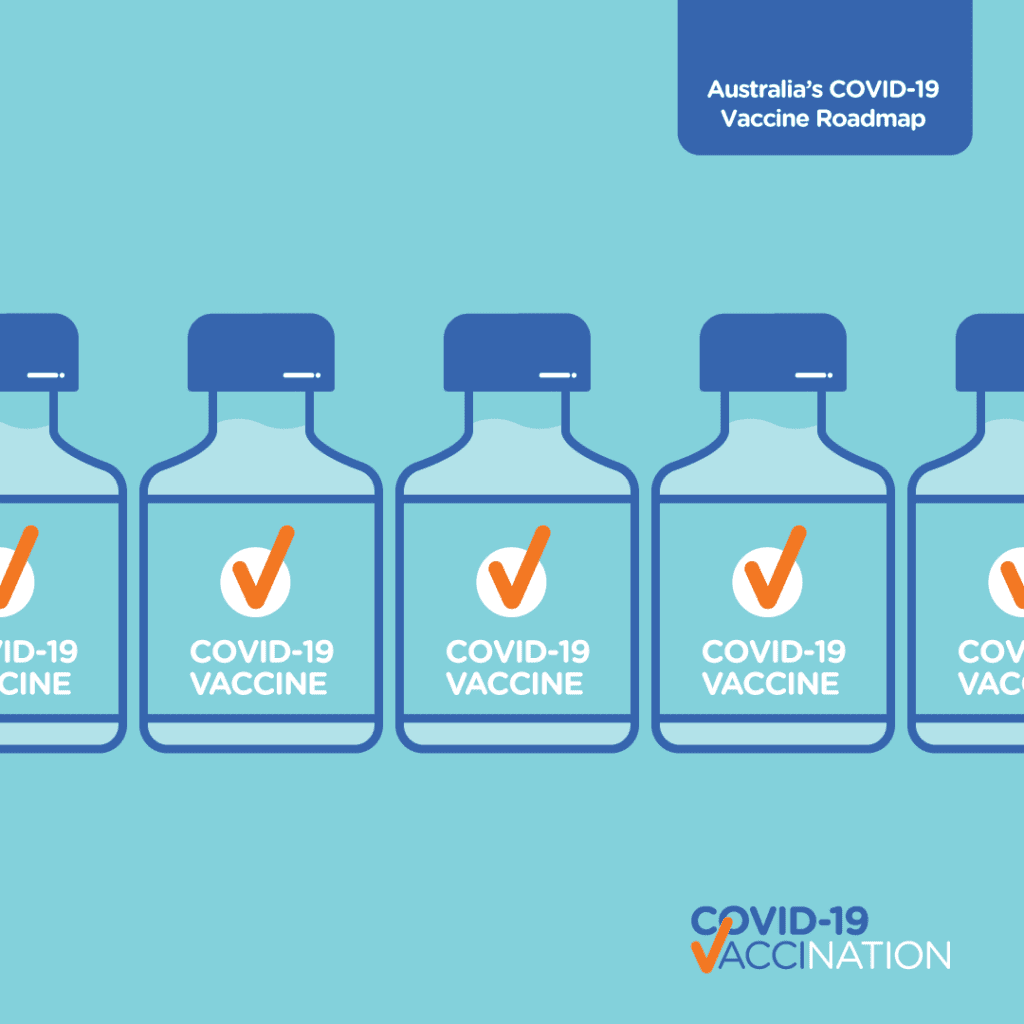Covid-19 Vaccines – Myths v’s Facts

BY TRACEY HORDERN
While there has been some confusion around vaccine messaging, there is one thing on which most health authorities agree: our best defense against COVID-19, especially the highly transmittable Delta variant is vaccines.
It is completely understandable to have questions about vaccines, or even to feel hesitant about getting your vaccine. And with so much information and misinformation around, we want to dispel some concerns, and help answer as many questions as possible.
Below are the evidence-based facts that address some of the more common Covid-19 vaccine myths.
Myth: The Covid-19 vaccine was developed quickly, so it is not safe.
Fact: The vaccines that are administered in Australia have been developed without compromising any quality, safety or effectiveness.
While it may seem that the development of the Covid-19 vaccines were rushed, the reality is researchers around the world have been working on vaccines for previous coronaviruses such as SARS in 2002 and MERS in 2012. This work gave researchers a valuable head start, when it came to developing the COVID-19 vaccines.
The other element that allowed the Covid-19 vaccines to become available so quickly is developers facilitated the collaboration between scientists, manufacturers and distributors to a degree that has never been seen before.
Due to unprecedented global investment, the development and implementation planning phases of the Covid-19 vaccines were run side-by side, instead of one after the other, that is typical of a pharmaceutical rollout.
In Australia, the Therapeutic Goods Administration (TGA) and Australian Technical Advisory Group on Immunisation (ATAGI), have been rigorously assessing any potential COVID-19 vaccines. This includes assessing the safety, quality and effectiveness of the vaccine before allowing it to be rolled out in Australia.*
Myth: The AstraZeneca vaccine is dangerous because it causes blood clots.
Fact: Most of us have heard about the link between the AstraZeneca vaccine and blood clots. While this is true, there is an extremely rare but serious side effect to this vaccine, known as thrombosis in combination with thrombocytopenia.
This rare side-effect impacts approximately four to six people in every million. The risk is marginally lower in older people, than it is for younger people. The experts at Australian Technical Advisory Group on Immunisation (ATAGI) continuously monitor any cases of this syndrome. Any incidences of this rare reaction to the AstraZeneca vaccine are made publicly.*
The AstraZeneca Covid-19 vaccine has been used in many countries, most noticeably in the UK, where it has been the vaccine of choice for the majority of the population.**
“Both the AZ and Pfizer are good vaccines – they have evidence that they work well. Both vaccines also have established risks. But as humans we like to be given the choice, which seems to be some people’s main hang up.
At the end of the day, it’s a personal preference around someone’s risk appetite. A 0.000031% risk of a blood clot (for those under 50 years) is nothing to some people, whereas to others that is completely unacceptable.
If you put the risk in real terms then people can make an informed decision. We take risks all day, every day. Unfortunately, this one has had a lot of limelight that has stuck out in people’s minds!”
- Dr Adam Ellerby, GP First Light Healthcare
Myth: The Covid-19 vaccine won’t work because the virus keeps mutating.
Fact: COVID-19 is no different to any virus – all viruses mutate. There are now several strains of Covid-19, with the current dominant strain being the Delta variant. The evidence to date concludes that the Australian Technical Advisory Group on Immunisation (ATAGI) has approved COVID-19 vaccines that are effective against all currently known variants.*
Myth: The Covid-19 vaccine causes infertility.
Fact: The Therapeutic Goods Administration (TGA) will not approve any vaccine for use in Australia unless it is safe and effective. This includes any impacts on fertility. None of the COVID-19 vaccines that are currently approved, or those that are under review by the TGA cause infertility.
There is also no evidence that antibodies formed from the COVID-19 vaccination – or in fact, any vaccine cause any problems with pregnancy, including the development of the placenta and the foetus.
For people who are trying to become pregnant or those that are planning to conceive in the future, they can safely receive the COVID-19 vaccine when it becomes available to them.*
Myth: The Covid-19 vaccine can change your DNA.
Fact: No vaccine can change your DNA. This confusion is possibly linked between the similarly named DNA and mRNA. However, there is a crucial difference between DNA and mRNA.
Our DNA is made up of a vast, large, double-stranded genetic code. The mRNA is a single-stranded copy of a very small part of the DNA, known as a messenger, that is released to send instructions to other parts of the cell. The mRNA is broken down quickly by the body. It cannot affect or combine with our DNA in any way to change our genetic code.
The Pfizer COVID-19 vaccine works with the body’s natural defenses to develop immunity to disease. The vaccine uses a fragment of the messenger RNA to instruct your body to make an immune response against COVID-19, by teaching the cell how to make a protein that triggers an immune response specific to COVID-19.*
Myth: The Covid-19 vaccine can give you Covid-19.
Fact: No vaccines approved by the Therapeutic Goods Administration (TGA) in Australia contain the live virus of Covid-19 and therefore, they cannot give you COVID-19. There are side effects from the vaccine such as fever and fatigue that are similar to the symptoms of COVID-19, but these are normal and are a sign that your body is building protection against the virus that causes COVID-19.
It also takes a few weeks after vaccination for the body to build protection against the Covid-19 virus. This time-lapse can allow a person to be infected with COVID-19, either just before – or just after vaccination, and then get sick from the virus.*
Myth: If you have had Covid-19, you don’t need the Covid-19 vaccine.
Fact: People who have had COVID-19 and recovered should still be vaccinated. The protection someone gains from having COVID-19 can vary greatly from one person to another. Because the Covid-19 virus is new, medical experts are still assessing just how long any natural immunity might last.
While we have been fortunate in Australia having very low numbers of COVID-19 infections compared to many parts of the world, the flip side of this means that the vast number of Australians have no immunity.
However, if you have had Covid-19, you should discuss any treatments you had with your doctor before you get vaccinated.*
Myth: The Covid-19 vaccine contains a microchip that can track you.
Fact: There is no vaccine that contains any form of software, including the Therapeutic Goods Administration (TGA) approved Covid-19 vaccines that are used in Australia. Without a software capacity, vaccines cannot be used to track people.*
Myth: Once you have had your vaccine shots you no longer need to take other COVID precautions.
Fact: The COVID-19 vaccines, while crucial, are only one part of Australia’s overall strategy to get back to a new normal. Initially, we will still need to continue with physical distancing, regular hand washing, and in some circumstances, we will most likely need to wear our masks. Some of these measures may be reduced once the vaccine program is fully rolled out in Australia and enough of us are vaccine protected. ***
Sources:
*Australian Government Department of Health
https://www.health.gov.au/
**GOV UK
https://www.gov.uk/
***NIB Australia
https://www.nib.com.au/



